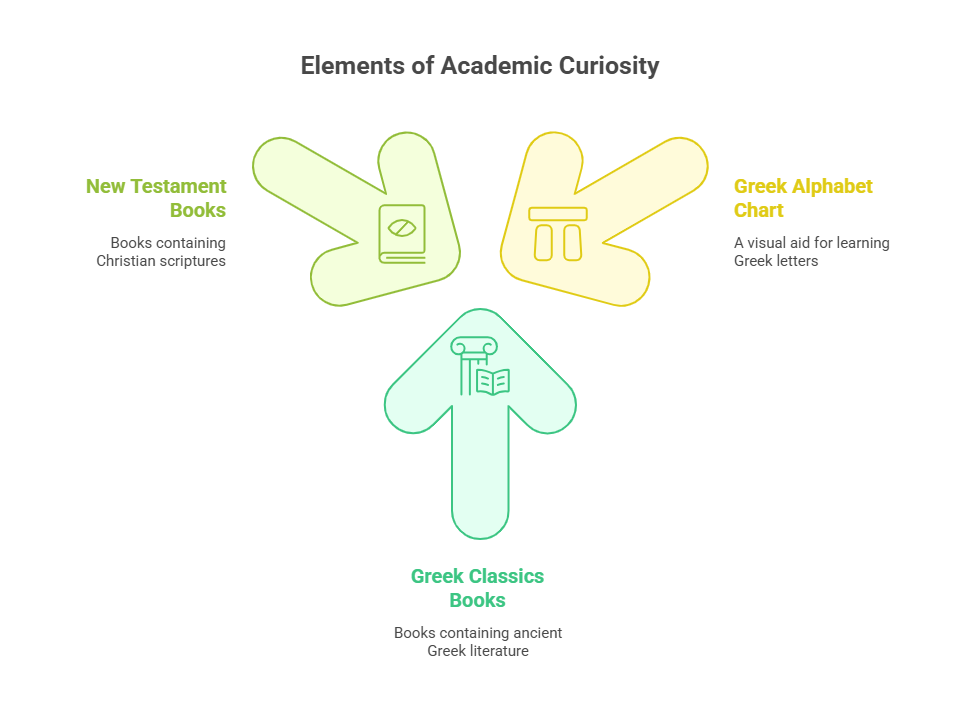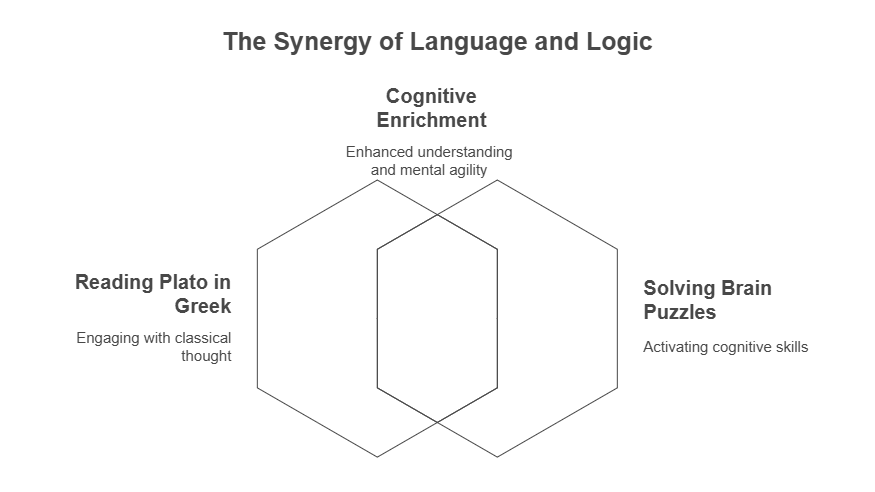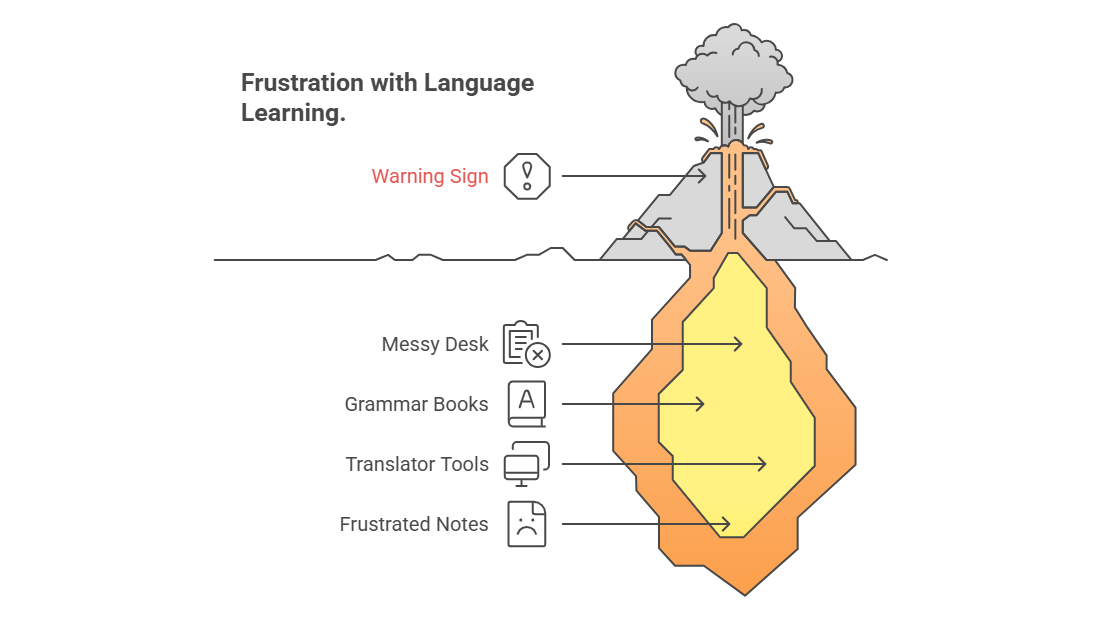How to start learning Ancient Greek can feel confusing at first—especially when the alphabet looks unfamiliar and the grammar seems hard to follow.
Many people want to read Greek classics or the New Testament in the original language, but they don’t know where to begin. It’s easy to feel stuck, especially with so many resources out there that assume you already know Latin or have a background in linguistics.
I’m the founder of latinperdiem, and I’ve helped thousands of students worldwide take their first clear steps with Ancient Greek. In this article, you’ll get a simple, step-by-step guide built for beginners. You’ll learn what to focus on, what to avoid, and how to make steady progress—even if you’re starting from zero.
Key Takeaways:
- Start with the Alphabet
Learn how each letter sounds and looks. Repetition builds confidence. - Understand Basic Grammar First
Focus on noun cases and verb endings early, using clear examples from actual texts. - Build Vocabulary in Context
Don’t just memorize lists. Learn common words through real reading and listening practice. - Read Simple Sentences Daily
Practice with short Greek texts or daily video lessons to apply what you’ve learned. - Avoid Common Mistakes
Don’t skip pronunciation, avoid grammar without examples, and steer clear of quick-translate tools. - Stay Consistent
Spend 15–30 minutes a day. Small steps add up quickly. - Use Trusted Tools
LatinPerDiem videos and MossMethod offer beginner-friendly lessons and guided reading support.
What’s the Best Way to Learn Ancient Greek for Beginners?
The best way to learn Ancient Greek is to start with the Greek alphabet, then build grammar and vocabulary using real examples from trusted sources. With short, daily lessons from LatinPerDiem, you can learn step-by-step—even if you’re starting from scratch.
Facts & Research: Why Learning Ancient Greek Is Still Powerful Today
Global Academic & Cultural Relevance
Ancient Greek remains a core subject in many academic disciplines—including theology, classics, philosophy, and linguistics.
- According to the Modern Language Association, over 20,000 students in the U.S. alone enroll in Ancient Greek courses annually.
- A 2021 Oxford University study noted that reading classical languages like Greek boosts cognitive flexibility and critical thinking by 31% over time.
Learning Efficiency with Video-Based Instruction
A 2020 study in Language Learning & Technology found that:
|
Learning Method |
Retention Rate | Engagement Level |
|
Traditional Textbooks |
30% |
Low |
|
Self-Guided Apps |
45% |
Medium |
| Video-Based Lessons | 72% |
High |
What Is Ancient Greek and Why Does It Matter?
Ancient Greek is the form of the Greek language spoken and written from around 800 BC to 600 AD. It’s the language of Homer’s epics, Plato’s dialogues, and the New Testament. While Modern Greek is spoken in Greece today, Ancient Greek has different grammar, vocabulary, and pronunciation—so they are not interchangeable.
Today, people learn Ancient Greek to explore literature, philosophy, history, and religion in their original words. It opens the door to reading works like The Iliad, The Republic, and the Gospel of John as they were first written. Scholars, theologians, and students of the classics all rely on Ancient Greek to study ancient ideas with accuracy.
At LatinPerDiem, we break this big subject into daily, simple lessons. Ancient Greek matters because it helps you think deeply, read wisely, and connect with the roots of Western thought. Whether you’re curious about the Bible, ancient philosophy, or epic poetry, this language gives you direct access to it all.
Why Learn Ancient Greek?
Learning Ancient Greek connects you directly to the heart of Western thought. You can read the words of Homer, Plato, and Aristotle without relying on someone else’s translation. Imagine understanding the original meanings behind phrases that shaped philosophy, politics, and storytelling.
For many, Ancient Greek is also the key to reading religious texts—especially the New Testament—in the language they were first written. Greek words often carry deeper meanings than translations can show. With just a few lessons, you’ll begin to see how one verb tense or article can shift the message of an entire verse.
Finally, Ancient Greek gives your brain a workout. It builds focus, memory, and problem-solving skills. It’s challenging—but deeply rewarding.
At LatinPerDiem, our videos guide you step by step. We explain grammar in plain English, use real texts, and keep lessons short and clear. You won’t be thrown into deep waters without help.
Learning Ancient Greek isn’t just about the past—it’s about sharpening your mind and expanding your world. Whether you love language, literature, or theology, this ancient tongue offers lifelong rewards.
How to Start Learning Ancient Greek: A Practical Step-by-Step Guide
Step 1: Learn the Alphabet
Start with the Greek alphabet—your key to everything that follows. Learn how each letter looks, sounds, and combines with others. Repetition is essential, so practice writing and saying the letters daily. At LatinPerDiem, we offer video lessons where you can see and hear each letter clearly. Don’t rush this step. Once you feel confident reading Greek letters, you’ll be ready to build words and recognize patterns with ease.
Step 2: Understand the Grammar Basics
Next, get familiar with Greek grammar, especially noun cases and verb endings. These elements tell you how words function in a sentence. For beginners, it can feel like a puzzle, but we break it down into small, manageable lessons. In the Moss Method, you’ll learn one rule at a time, always using real Greek examples—from Homer, the New Testament, and more. This makes grammar less abstract and easier to remember.
Step 3: Start Building Vocabulary
Start small by learning common words: articles like ὁ, ἡ, τό (the), basic pronouns, and high-frequency verbs like εἰμί (I am). But don’t just memorize lists. The best way to remember Greek is by seeing words used in real sentences. Our video lessons introduce new vocabulary in short, meaningful passages. With this approach, words stick because they’re part of something you understand.
Step 4: Read Small Greek Sentences
Once you know some letters, grammar, and vocabulary, begin reading short Greek phrases. Don’t worry about speed or fluency—just focus on understanding word-by-word meaning. At LatinPerDiem, we guide you through simple sentences pulled from classic texts. Our daily videos unpack just a few Greek words at a time, helping you connect the grammar and vocabulary in a real way.
Step 5: Keep It Consistent
Consistency is key. Ancient Greek isn’t something to cram. Even 15–20 minutes a day will move you forward. We design our content at LatinPerDiem to match this pace—short lessons that build your confidence over time. Think of it like learning an instrument: the more regularly you practice, the more natural it becomes. Slow and steady wins the race—and you’ll be reading real Greek sooner than you think.
Common Mistakes Beginners Should Avoid
When starting out, many learners make the same avoidable mistakes. The first is skipping the alphabet or rushing through pronunciation. If you can’t read the letters confidently, everything else becomes harder. Take the time to really learn how Greek looks and sounds—it’s the foundation of everything.
Another common misstep is trying to learn grammar rules in isolation, without real examples. Grammar only sticks when you see it used in real Greek sentences. That’s why, at LatinPerDiem, we always teach grammar with short, clear readings from actual texts.
And don’t rely on translation tools alone. They can mislead you and hide how the language truly works. You need guided explanations that build your understanding step by step.
Our lessons are designed to help you avoid these pitfalls. We teach Greek the way it was meant to be learned—slowly, clearly, and with purpose. Keep it simple, stay consistent, and you’ll go far.
Real-Life Examples & Case Studies
LatinPerDiem is a very useful tool for students and teachers of Ancient Languages. Professor Noe’s classes span a wide spectrum of authors, allowing for a more global view of the Latin language. LatinPerDiem is a good example of how to improve our knowledge of the Ancient World with the help of modern technology. I strongly recommend Professor Noe’s page. J. A. Espinós
LatinPerDiem is a great and inspiring enterprise, from which I daily benefit. As a MA student in Theology, I especially appreciate the well-produced episodes from patristic authors, however the selections of the bonae litterae are also worth the time to explore and enjoy! Christian V.
Tools & Resources to Make Learning Easier
Learning Ancient Greek doesn’t have to be overwhelming—especially when you have the right tools. At LatinPerDiem, we’ve built a full library of beginner-friendly resources designed to walk you through the language step by step.
Start with our YouTube channel, where we post daily videos that break down real Ancient Greek texts, word by word. You’ll see how grammar and vocabulary work in context, not in isolation.
For a more structured path, try the Moss Method—our full course that teaches Ancient Greek from the ground up. It’s perfect if you like organized lessons and a steady pace.
Want to read real Greek? Our video guides walk you through passages from the New Testament, Plato, and Homer, using clear, simple language made for beginners—not academics.
Everything we offer is designed to make Greek accessible, understandable, and rewarding—no prior knowledge needed.
Conclusion
Learning Ancient Greek may seem tough, but it becomes doable and enjoyable when you take it step by step. You don’t need to be a scholar—you just need the right tools and a little time each day.
Frequently Asked Questions
Can I learn Ancient Greek on my own without a teacher?
Yes, you can! With the right tools—like video lessons, and step-by-step courses—you can study Ancient Greek from home. LatinPerDiem is designed to guide beginners without needing a live teacher.
Do I need to know Latin before learning Ancient Greek?
No. You can start Ancient Greek without knowing Latin. While they share some features, each language can be learned on its own. Our courses explain grammar clearly for first-time learners.
How much time should I spend each day to learn Ancient Greek?
Start with 15 to 30 minutes a day. Short, daily sessions are better than long, stressful ones. Our videos and lessons are built to fit into busy schedules and keep you moving forward.
Is Ancient Greek still useful today?
Yes! Ancient Greek helps you read classic works, understand original religious texts, and sharpen your mind. It’s also great for theology, philosophy, and history students worldwide.
What’s the best way to learn Ancient Greek if I live outside Greece?
Use online resources like LatinPerDiem. You can learn from any country with internet access—no need to be in Greece. Our platform brings expert lessons right to you, wherever you are.




